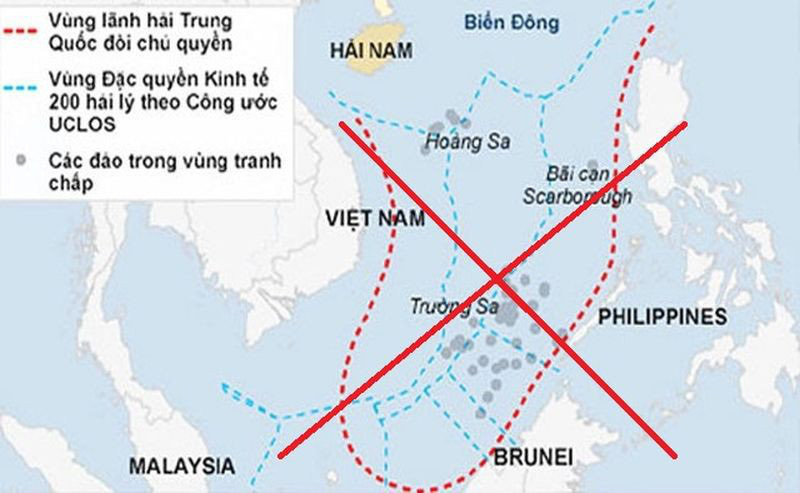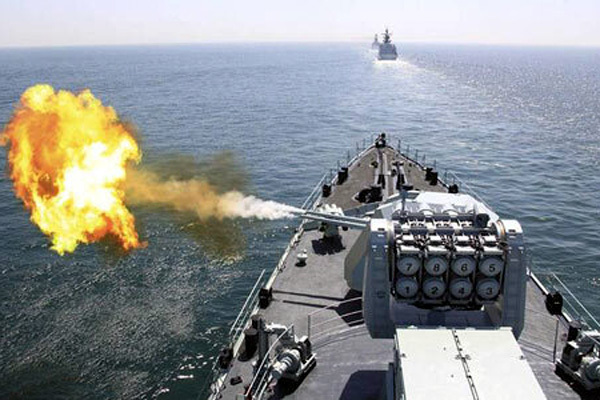China needs to give up its claims
Firstly, the viewpoint is fairly clear: China needs to give up (not should give up) its 9-dash line claim. This is no longer the opinion of a scholar but it represents a trend. In terms of public opinion, legislation and in the field, conflicts have arisen related to this claim of China in the East Sea (internationally known as the South China Sea).
Many countries want China to give up its sovereignty claim. Recently, there was a "war of diplomatic notes" opposing China's 9-dash line sovereignty claim for its lack of legal basis.
 |
|
China needs to give up (not should give up) its 9-dash line claim.
|
More than 80 organizations and associations in Europe, Canada, Australia, the United States and Japan have sent letters to the three foreign ministers of the UK, Japan, and India, calling for them to speak out against China's claims in the East Sea. The international pressure has increased, resonating with the challenges and consequences of the 9-dash line. Researcher Li Nan said this is the time for China to give up its claim.
Secondly, the statements of politicians, diplomats, international scholars and Mr. Li Nan indirectly indicate that China's 9-dash line sovereignty claim is a "bottleneck" that hinders negotiations on settlement of disputes in the East Sea and also hinders China's relations with many other countries.
China's change of sovereignty claims will contribute to peace, security and development cooperation in the East Sea and the region. At the same time, according to Li Nan: "It can help China increase its soft power and have friends in ASEAN".
Thirdly, some Chinese experts and many opinions on Chinese social media have expressed similar views. Previously (since 2005), Chinese experts Li Linghua and Zhang Guang Rui already explained why China should abandon its 9-dash line claims.
Many people also wonder: Is China’s change of its 9-dash line claims in the East Sea a reality, hope or just an illusion? The most accurate answer comes from Chinese leaders.
It is difficult for China to voluntarily abandon its 9-dash line claims
China's views, strategies, policies and practical actions in the East Sea have been a long-term, cross-cutting issue, associated with the "Belt and Road" initiative and the "Chinese Dream". There are many obstacles in the North, East, and West directions while the South/East Sea is a convenient direction/region, a springboard, for China to reach out to the world.
The East Sea is not only rich in oil and gas reserves and natural resources in the genearl, but also is one of the most exciting sea routes in the world. Controlling the East Sea will affirm China's position and strength.
 |
|
China has stepped up militarization in the East Sea. Photo: 81.cn |
By illegally occupying Hoang Sa archipelago (Paracel Islands), illegally occupying and renovating many rocks and shoals in Truong Sa archipelago (Spratly Islands), strengthening military forces and means in the East Sea, China has created many advantages over not only the countries that are involved in the East Sea disputes but also with the US and its allies. China believes that giving up its claims is like giving up its ambition - "the Chinese Dream".
If China abandons its 9-dash line claims, it will also face reactions from extreme nationalist ideology, the consequences of propaganda, and the inciting of public opinion. The Chinese naval forces, coast guard... also object to the abandonment of the 9-dash line because it will affect their roles and privileges, and consequently, a decrease in state investment!
Facing international public opinion, China has adjusted its tone, which is softer, but basically, its “Wolf Warrior diplomacy" hasn't changed. At international forums, conferences, and in diplomatic activities, Chinese leaders have always asserted this country’s historic sovereignty over the East Sea. They avoided the opposition against the 9-dash line with the "Four Sha" theory and the exclusive economic zone of 200 nautical miles from the straight baseline surrounding the Hoang Sa and Truong Sa archipelago of Vietnam ...
"The Four Sha" theory is essentially a metamorphosis of the 9-dash line and it does have a legal basis. But according to China, it is clearer, more specific because it is associated with four archipelagos, including Hoang Sa (which has been completely occupied illegally by China) and Truong Sa (which is partially illegally occupied). Therefore, to oppose the 9-dash line or "the Four Sha" theory also means to oppose sovereignty claims that are inconsistent with the law of China in the East Sea.
Stalling for time
China keeps militarizing islands and rocks, increases its forces and activities in the East Sea, and pressures and deters the countries involved in the East Sea disputes. The Chinese coast guards and marine surveillance forces have supported more than 2,000 Chinese fishing boats to spread operations to the South in order to exercise real sovereignty control over the East Sea. These forces have also prevented, driven away, and hindered other countries from conducting economic and scientific activities ... in accordance with international law on their exclusive economic zones and continental shelf.
China is the "world factory", an indispensable "link" in the global supply chain, especially when the global economy is in serious decline and protectionism has increased during the Covid-19 pandemic. China knows clearly its position and it thinks that the world needs China even though they disagree with China’s policies. China tries to play for time and wait until the US presidential election, hoping that America's foreign policy will change.
By playing the economic, trade and diplomatic-propaganda cards, China also stalls for time in building and negotiating a Code of Conduct (COC) in the East Sea with ASEAN, making it not really binding, associated with implicit demands of the admittance of the "new status quo" in the Spratlys and the East Sea and discourages the involvement of the US and other countries in the region.
Once the development of the COC fails to meet expectations, China will blame other countries. China does not give up on the 9-dash line. It only changes the outer shell (like the "Four Sha” theory). While public opinion debates and finds countermeasures, China continues to control the East Sea in practice.
China has a high political determination in controlling the East Sea, has economic and military advantages ... With a large country and China's political institutions, the "policy inertia" is quite large, the change of the 9-dash line and sovereignty claims is difficult. That is China’s calculation, but everything depends not only on China.
Refrain from war, prevent or promote?
According to Thucydides' theory, war is inevitable between the ruling power and the rising one. The US and China are the two leading powers, which possess nuclear weapons, and if there is a war, the consequences will be enormous for both sides and the world.
Therefore, a war and large-scale armed conflicts are less likely to happen, but a "cold war" and tense confrontations in many areas have become complicated, with no signs of cooling down.
The US recently changed its views on the East Sea issue.
US Secretary of State Mike Pompeo and many other officials affirmed: China's claim to natural resource interests covering most of the East Sea is completely illegal ... China has no legal basis to unilaterally impose their will to the region... The US supports the Permanent Court of Arbitration (PCA)'s ruling on the East Sea. The world does not allow Beijing to see the East Sea as its maritime empire ... The US has increased FONOP (freedom of navigation) activities in the East Sea and assists countries in the region to restrain China.
US allies and many other countries also expressed support for the US declaration, their concerns about sovereignty disputes in the East Sea, and required the parties to exercise restraint in accordance with international law. That puts pressure on China.
However, countries also face complicated internal problems, especially economic difficulties, and ties in cooperation with China. For some countries that are not directly involved in sovereignty disputes in the East Sea, the challenge in the East Sea is still "far fire", which has not yet set fire to their house! So their participation in US-initiated practical activities to contain China is moderate.
The US acting alone and some countries' protests against the 9-dash line has not created enough pressure to force China to give up its claim.
Building a security mechanism to restrain collisions and prevent tense actions, conflicts are necessary. But it is more important to push China to change its East Sea sovereignty claim which is inconsistent with international law, and not conducive to peace, stability, security and development cooperation in the region, or other countries.
To realize the "Chinese Dream", to rise to lead the region and the world, China needs a favorable environment and support from other countries. To make China clearly see that the benefits (if it changes) and the expensive costs of trying to maintain the East Sea sovereignty claim are inconsistent with international law, with the general trend, is to promote China to change itself. To do so, countries must have a great consensus in declaration and action for the common good.
Dr. Vu Dang Minh

China changes its 'wolf warrior' diplomacy
China has shifted from a 'wolf warrior' diplomacy to calling for the implementation of three points on dialogue, cooperation and dispute control, as Politburo member Yang Jiechi and Foreign Minister Wang Yi said recently. They are:

Three scenarios for US-China competition
Entering the third quarter of the year, US-China tensions have become increasingly fierce, in all aspects from trade and human rights to the fight against the Covid-19 pandemic, issues related to the East Sea, and closure of technology firms.